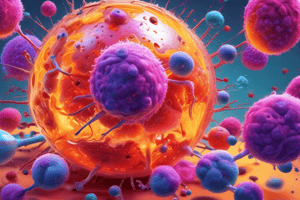Podcast
Questions and Answers
What characterizes autoimmune diseases?
What characterizes autoimmune diseases?
- A normal response to a pathogen
- An abnormal response to self-antigens (correct)
- A weakened immune system
- An overactive immune response to an allergen
What is a possible consequence of immunodeficiency?
What is a possible consequence of immunodeficiency?
- Improved response to vaccines
- Reduced risk of allergic reactions
- Multiple and unusual infections (correct)
- Increased susceptibility to cancer
What is the primary difference between primary and secondary immunodeficiencies?
What is the primary difference between primary and secondary immunodeficiencies?
- Secondary immunodeficiencies are more severe
- Secondary immunodeficiencies are caused by infections
- Primary immunodeficiencies are more common
- Primary immunodeficiencies are present at birth (correct)
Which type of hypersensitivity involves IgE antibodies?
Which type of hypersensitivity involves IgE antibodies?
What is the goal of comparing and contrasting types I, II, III, and IV hypersensitivities?
What is the goal of comparing and contrasting types I, II, III, and IV hypersensitivities?
What is the primary focus of comparing and contrasting types I, II, III, and IV hypersensitivities?
What is the primary focus of comparing and contrasting types I, II, III, and IV hypersensitivities?
What is a characteristic feature of autoimmune diseases?
What is a characteristic feature of autoimmune diseases?
What is a possible outcome of secondary immunodeficiencies?
What is a possible outcome of secondary immunodeficiencies?
What is a common cause of autoimmune diseases?
What is a common cause of autoimmune diseases?
What is a potential consequence of immunodeficiency diseases?
What is a potential consequence of immunodeficiency diseases?
Study Notes
Hypersensitivities
- Compare and contrast immunological reactions involved in types I, II, III, and IV hypersensitivities
- Examples of each type of hypersensitivity can be described
Autoimmunity
- Autoimmunity is defined as a state where the immune system attacks and damages the body's own tissues
- Possible causes of autoimmunity include genetic predisposition, environmental factors, and hormonal imbalance
- Treatments for autoimmunity include immunosuppression, plasma exchange, and biological response modifiers
Immunodeficiencies
- Primary immunodeficiencies occur when the immune system fails to develop properly, often due to genetic defects
- Secondary immunodeficiencies occur when the immune system is compromised by external factors, such as infections or cancer
- Compare and contrast primary and secondary immunodeficiencies
Immunodeficiency and Infections
- Immunodeficiency can lead to multiple and unusual infections due to the impaired immune system
- Examples of infections that may occur in individuals with immunodeficiency include opportunistic infections, such as Pneumocystis pneumonia and Tuberculosis
Studying That Suits You
Use AI to generate personalized quizzes and flashcards to suit your learning preferences.
Description
Test your understanding of the immunological reactions involved in different types of hypersensitivities, autoimmunity, and immunodeficiencies. Learn about the causes, examples, and treatments of these immune system disorders.




